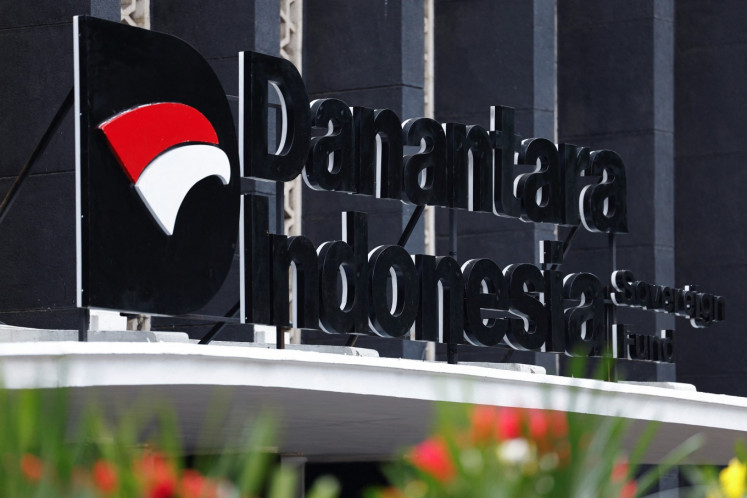Popular Reads
Top Results
Can't find what you're looking for?
View all search resultsPopular Reads
Top Results
Can't find what you're looking for?
View all search resultsHappiness, positive psychology and liberated learning
The motivation and self-help industry is worth US$64 billion worldwide
Change text size
Gift Premium Articles
to Anyone
T
he motivation and self-help industry is worth US$64 billion worldwide. People, who are seeking for a voice of reason and enlightenment, turn to print, electronic, and audio books and videos of motivational learning.
It taps a huge market for the optimization in human achievement, which can be attained more efficiently through positive psychology and liberated learning.
It is something to ponder upon pertaining to optimization of dissemination of democratic learning opportunities throughout the Indonesian archipelago. By narrowing the digital divide throughout Indonesia, we should be able to implement effective liberated learning through an online environment based on positive learning psychology.
While many of self-help and motivation gurus are self taught, a few distinctive positive psychologists are making their marks in the scientific study of optimal human functioning. In a nutshell, positive psychology is based on understanding of creating an environment that fosters happiness while limiting anxiety. The state of happiness as a feeling must be translated into learning activities.
One of the most prominent positive psychologists and educators is Tal Ben-Shahar at Harvard. One of the popular topics he teaches is the pursuit of happiness, which is an underlying element in optimization of human achievement.
In his extremely popular class, Ben-Shahar defines “happiness” as the overall experience of pleasure and meaning. Happiness, after all, is the key to optimized, if not maximized, human achievement.
Pleasure and meaning play important roles in the optimization of human achievement, which are derived from Sigmund Freud (pleasure) and Viktor Frankl (meaning)’s theories. And for both elements to work in alignment, reconciliation of present and future benefits should be prevalent.
In liberated learning framework, both present and future benefits are also placed in proportionate importance. Using the latest information technology revolution, such as social networking and open source CMS (course management system) platforms, economical and instantaneous communication channels can be opened. Both synchronous and asynchronous interactions can be made and learning styles can be catered for without worrying about geographical limitations.
According to Liberating Learning: Technology, Politics, and the future of American Educationby Terry M. Moe and John E. Chubb, in 2006 alone, almost three-quarters of a million K-12 public school students in USA took and completed online courses. According to SLOAN Consortium, a professional organization dedicated to integrating online education into the mainstream of higher education, in Fall 2008, with over 4.6 million college students took at least one online course.
Among the top universities in the United States integrating online with mainstream courses are Stanford, UC Berkeley, University of Wisconsin, Columbia University, NYU, and California State University System. On K-12 level, California Virtual Academies provide free online public education curricula that would prepare students for future demands as guided by credentialed teachers using the promises of online technology. Learning is both individually tailored and mass marketed.
Learning is “individually tailored” as students and parents have the freedom to choose learning subjects and styles that fit their needs, while it is “mass marketed” as learning is no longer a scarce commodity in which one class of tens of students must be taught by a teacher who is a sage on the stage. Teachers are facilitators by the side whose main interest is ensuring a positive learning environment to optimize knowledge and skill retention. Here, Freud’s philosophy of pleasure and Frankl’s philosophy of meaning play a distinctive role.
It might take a while for Indonesian education policy makers to agree to adopt such advanced techniques in learning, particularly in distributed liberated learning. However, we should be aware of its highly applicable and effective nature. Positive psychology, after all, is something that does not require a lot of capital, instead merely dedicated soft skills advancement. And liberated learning with distributed online technology relies more than low-cost open source platforms.
University of the People, a new online university that doesn’t charge any tuition fees is an example of democratization and equalization of learning opportunities using open source instructional materials and low-cost Internet-based technologies. By not worrying about tuition fees and geographical location, a student has two fewer things to fret about, hence allowing increased happiness.
To advance to this stage, there is an overlooked urgency requiring a change of mindset among educators in Indonesia, where a teacher is not a sage on the stage any longer, but more of a facilitator by the side, and a change in policy that would foster Internet equality by eliminating digital divide as much as possible.
Let us push the direction of education policies in Indonesia to allow equality in learning opportunities by implementing reliable and affordable — if not free — Internet connections throughout the country. That’s an important beginning to a smarter and technologically-literate human capital prepared to compete in a globalized world.
The writer is an Indonesian-born author, columnist and educator based in Northern California.










